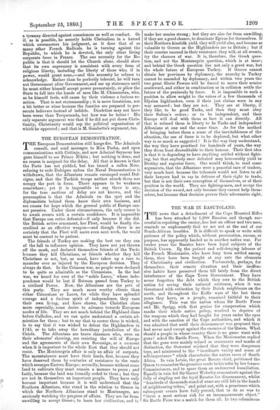THE EUROPEAN DEMONSTRATION.
THE European Demonstration still hangs fire. The Admirals consult, and send messages to Riza Pasha, and open communications with Cettinje, and now Admiral Seymour has gone himself to see Prince Nikita ; but nothing is done, and no reason is assigned for the delay. All that is known is that the Porte has not yielded, but has issued a sullen Note, refusing to cede Dulcigno unless the Naval Demonstration is withdrawn, that the Albanians remain encamped round Dul- cigno, and that the Turkish troops neither attack them nor occupy the port in force. There appears to be weakness somewhere ; yet it is impossible to say there is any, for the true motives of delay are not known, and the presumption is that the Admirals on the spot and the diplomatists behind them know their own business, and see causes for hope which the general public of Europe can- not perceive. Under those circumstances, the only course is to await events with a certain confidence. It is impossible that Europe can retire defeated—if only because if she did, the British active armament, her Fleet, would be finally dis- credited as an effective weapon—and though there is no certainty that the Fleet will move even next week, the world must be content to be patient.
The friends of Turkey are making the best use they can of the lull to influence opinion. They have not yet thrown off the mask, and declared themselves friends of the Turks because they kill Christians, or friends whether they kill Christians or not, but, as usual, have taken up a race to maunder over as injured by the European decision. They always do that. In the Crimean war, no people were declared to be quite so admirable as the Circassians. In the last war, we heard for ever of the "noble Lazes," whose inde- pendence would be lost if Batoum passed from Turkey to a civilised Power. Now, the Albanians are the pets of this party. They are much more worthy clients than either Circassians or Lazes, for while they have splendid courage and a furious spirit of independence, they earn their own living, and have shown, the Christian clans more especially, some desire to advance towards European modes of life. They are not much behind the Highland clans before Culloden, and we can quite understand a certain ad- miration for them ; but to say that to coerce them is wicked, is to say that it was wicked to defeat the Highlanders in 1745, or to take away the hereditary jurisdiction of the Chiefs. The Albanians are brave clansmen who, even on their advocates' showing, are resisting the will of Europe and the agreements of their own Sovereign, at a moment when it is important to the whole East that they should not resist. The Montenegrin affair is only an affair of outposts. The mountaineers must have their lands, first, because they have deserved them by centuries of resistance to the caste which scourges Eastern Europe; secondly, because without some land to cultivate they must remain a menace to peace ; and lastly, because the land was formally ceded to them ; but they are not in themselves an important people. They have only become important because it is well understood that the Southern Albanians, who stand in the relation to Greece in which the Northern Albanians stand to Montenegro, are anxiously watching the progress of affairs. They are far from unwilling to accept Greece, to learn her civilisation, and to
make her armies strong; but they are also far from unwilling, if they see a good chance, to dominate Epirus for themselves. If their Northern kinsfolk yield, they will yield also, and become as valuable to Greece as the Highlanders are to Britain ; but if their cousins succeed in their resistance, they will, at all events, try the chances of war. It is, therefore, the Greek ques- tion, and not the Montenegrin question, which is at issue; and behind the Greek question lies not only a great war, but the whole future of European Turkey. If Greece cannot obtain her provinces by diplomacy, the anarchy in Turkey cannot be amended by diplomacy, and within two years the two great Slavic Powers will be forced to move their armies southward, and either in combination or in collision settle the future of the peninsula by force. It is impossible in such a position to allow weight to the voices of a few thousands of Illyrian highlanders, even if their just claims were in any way menaced ; but they are not. They are at liberty, if they like, to be good Turks, and then they must obey their Sultan's orders ; or to be independent, and then Europe will deal with them as best it can directly. All that is refused them is liberty to be Turks and independent Albanians at one and the same time. As for the method of bringing before them a sense of the inevitableness of the situation, the use of force is to be deplored, but what other way is so much as suggested ? It is the way they understand, the way they have practised for hundreds of years, the way they deem least discreditable to their honour. Their first idea is that it is degrading to have anything settled without fight- ing, but that anybody once defeated may honourably yield to Destiny and superior force. One would think, to read some arguments, that the Albanians were a peaceful race of traders, very much hurt because the tribunals would not listen to all their lawyers had to say in defence of their right to trade, but that is not their own conception of themselves, or of their position in the world. They are fighting-men, and accept the decision of the sword, not only because they cannot help them- selves, but because that decision proves their adversaries right.


































 Previous page
Previous page